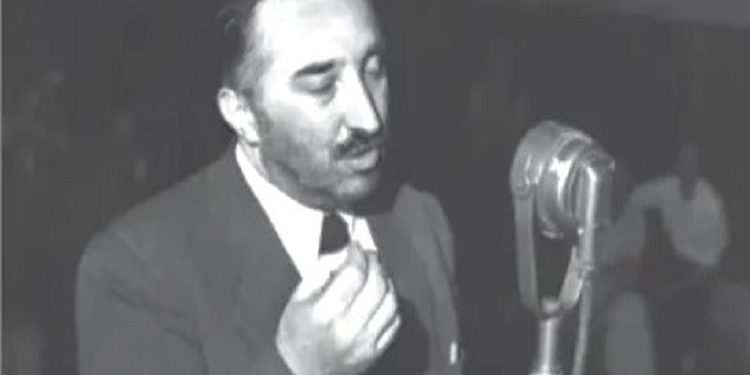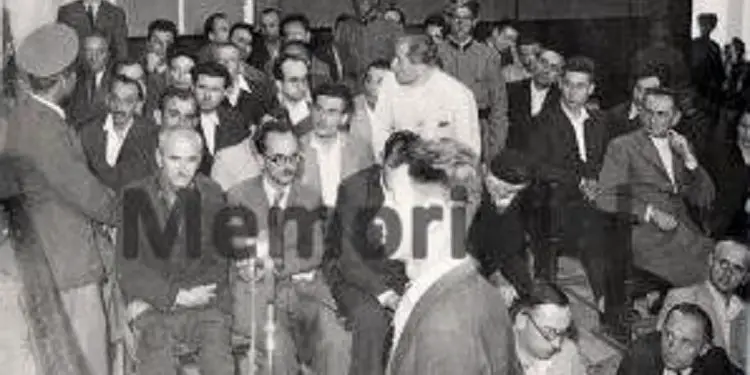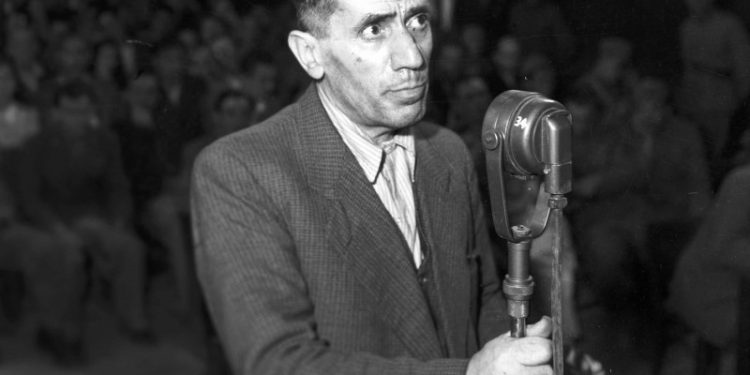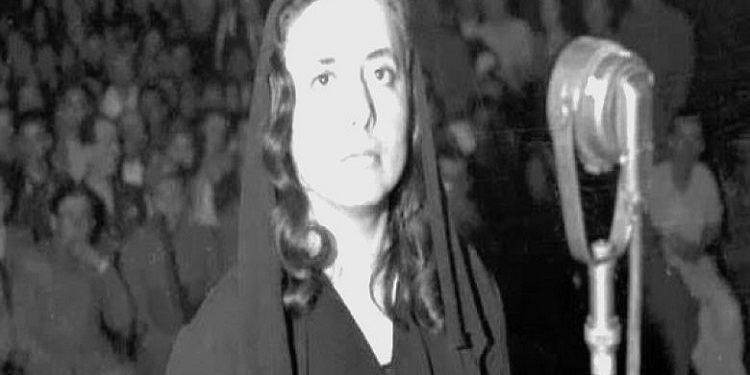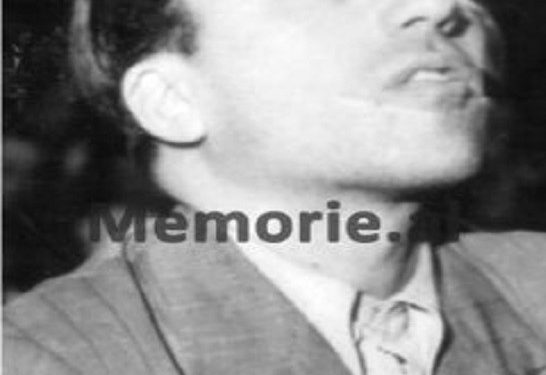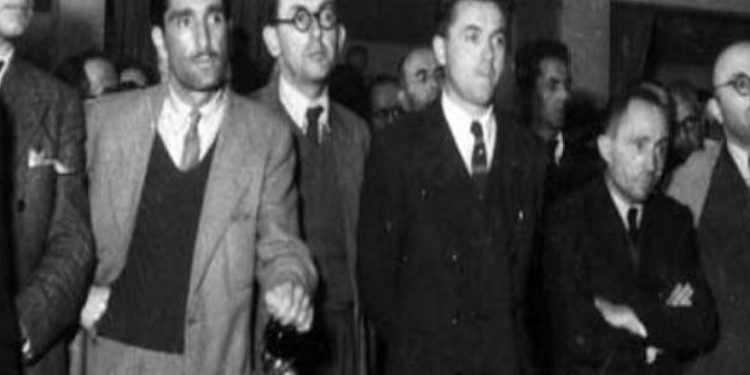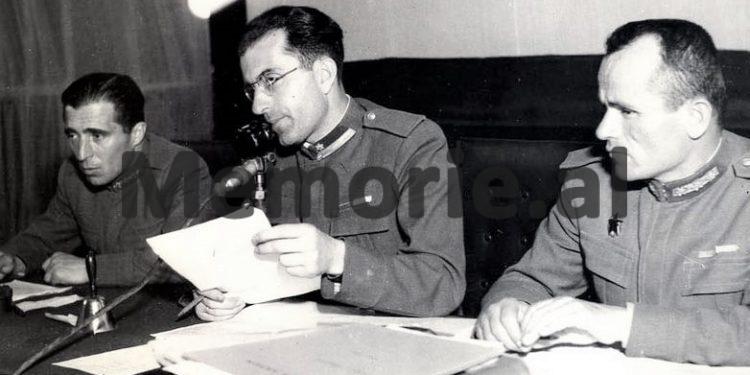Dr. Enriketa Pandelejmoni (Papa)
The third part
-Gjergj Kokoshi and his political contribution, in an atypical political atmosphere in post-war Albania-
Memorie.al / In this paper, the figure of Gjergj Kokoshi will be treated, in the context of his political contribution, in the first year after the Second World War, based on mainly archival sources, from the Central State Archive and from Archive of the Authority for Information on Former State Insurance Documents. The aim is to carry out a study, based on archival sources and discursive analysis, to shed light on one of the most interesting and least understood figures in the first year of the consolidation of power by the Communist Party, such as Gjergj Kokoshi.
Continues from last issue
It is important to mention here that a few months ago in Durrës, some people sent a telegram to the government, asking for mercy for some people who were sentenced to death by the local court. For this, they were immediately arrested, brought to court and sentenced to prison, since with their attitude, they had gone against the court decision, which is considered as the highest expression of the will of the people! The activity of the People’s Protection and the way in which justice was carried out, have created an atmosphere of fear and terror throughout the country. Of course, this has increased the number of the dissatisfied, but fear, and only fear, has prevented them from organizing in an opposition.
If you don’t know this underground thing, it is impossible to find out why the people will go to the polls on December 2, how could it be otherwise, while Albania was under the most terrible dictatorship that history has seen for 13 months her? Go to the villages and talk to the secret people and then you will find that a pressure has been exerted in favor of the unique list of the National Liberation Front.
(h). Albania has never had an army as big as the current one; its number has doubled since the liberation of the country and now consists of about 60,000. The maintenance of such a large army is mainly due to the fact that the authorities fear that the continued number of disaffected could pose a danger to the regime. This political measure has had a catastrophic effect, not only for our finances, which comprise more than half of the budget for the army, but also for agriculture and livestock, in which the lack of labor is seriously felt.
(i) In our administrations there are almost four times more officials than before. This corresponds to the fact that the government can find jobs for all loyal employees regardless of their capacity. Nevertheless, in order to have a satisfactory administration, they are obliged to retain some of the best technicians and, in fact, they are the ones who do all the work. But this situation has created some chaos and, for this reason, this is the reason that in the provinces the work is too long.
(j). The agricultural law is one of the most important reforms, for which the regime is proud. This is done and applied in an extreme way: 1. The land, which was left to the previous owners (15 hectares), is insufficient to provide them with life, although they have enough land for everyone. 2. The agricultural law, as it exists, is only a confiscation, since the whole land is expropriated, not being rewarded at all.
(k). The government has lost the confidence of traders due to the measures they have among the various branches of economic activity. Private initiative has almost completely disappeared.
(I) As far as foreign policy is concerned, the current government remains loyal to the Belgrade-Moscow axis. The slogan “Enver-Tito” has become common.
Who are we?
It is necessary to emphasize that we are not the enemies of communism. Even if communism did not exist, it would be useful to create it as a driving force towards social progress. But, on the other hand, we are his political opponents, until he violates political freedoms and sets up a despotic government instead of a democratic one.
Is democracy possible in Albania?
It is premature to talk about a Western-type democracy in Albania. Yes, on the other hand, this does not mean that there is a need for a totalitarian government in our country. We believe that a relative democracy, with at least 2 parties, is completely possible in Albania. This would give the majority of the people, who are not communists, an opportunity to join an organization, through which they would be able to express their political ideas.
What is our program?
(a). Domestic policy
Immediate establishment of full political freedom. Freedom of religion, freedom of the press, freedom of persons and protection before the law and before the trial, with elected judges.
(b). Foreign policy
Participation in all the United Nations, in the establishment of an internationalist rule, based on the principle of collective security. Maintaining friendly relations, with all our great allies and with all our neighbors. We will try with all our strength to contribute to a peaceful and better future in the Balkans and ensure our territorial integrity, in accordance with the spirit and the Atlantic Charter.
(c). Social policy
The material and moral improvement of the living conditions of the working class. Full participation of workers and peasants in political life. Freeing workers’ organizations and their participation in setting working conditions. Democratization of institutions. Restoring family identity.
(d). Economic policy
Full respect of private property, within the limits of social functions. State control over vital industries and encouragement of initiative and private enterprise.
(e) Agrarian reform
The construction of modern houses for the peasantry and the creation of agricultural cooperatives.
Our burning desire
Considering that your mission in Albania is sacred, since it is your duty to tell the world the true situation of our country, we hope you will find that in the current situation, talking about free elections means to obscure the truth. In this spirit, we hope that you will become an interpreter, not only of the opposition, but of almost the desire of the entire nation, for the postponement of the elections, in order to give the people a chance to freely express their will and in this way to establish a representative democratic government.
You will see a large number of achievements, which will be shown to you on behalf of the current government. We do not question the good will of the government, but, at the same time, we call it necessary to underline that most of these achievements existed before November 1944. As for bridges and other works of this type, every Albanian knows well that these were built by Italian companies, under Albanian supervision, with materials brought from Italy”.
In addition to the memorandum, in the meetings held by the “Democratic Union” groups, each presented their respective programs. Musine Kokalari presented that of the ‘Social-Democrats’, which was also represented by Sami Çeribari, that of the ‘Resistance Group’ where, among other things, it aimed to create connections with political fugitives outside Albania, with the people inside, for organized an uprising against the communist regime.
As the head of this group, he drew up a call to escapees abroad and those in the main cities, where he informed them of the formation of the “National Committee” that invited all opponents of the regime to join them in their effort. In fact, Sami Çeribari informed the group that it was thought that before the elections, on November 28, on the occasion of the Independence Day, a demonstration would be organized and the postponing of the elections would be requested. Therefore, a call to the people was prepared:
November 28, 1945
Albanian brothers!
Today, on this holy day, the time has come for us all to unite and remove the mask from the enemies of the nation, who have captured our votes and are leading us to the abyss.
The Communist Party, which is in power today with terror, as you all know, is nothing but a blind tool of Slavic Imperialism. This party, which reigns today in Albania, just as it sold Kosovo, has handed over all of Albania to Tito, very quickly.
It belongs to us, the people and true patriots, who love this country with the right sincerity, to save the Motherland from this great disaster that has happened today.
Since it is being trumpeted here that there is supposedly a lot of freedom, propaganda words, we inform you that all together, we should go to the Allied missions and ask them to intervene, to postpone the elections, to show the world that there is a strong Opposition, which is able to gather around it the overwhelming majority of the Albanian people and has forms for this purpose; The coalition of parties with democratic tendencies (‘Monarchist Party’, ‘Social-Democrat’ and that of the ‘Resistance’).
The demonstration was not held for fear of surveillance and only anti-government tracts were thrown. All were sent to the British and American missions, but none of them intervened with the Albanian government to postpone the elections. The disappointment and bitterness of their non-intervention can also be seen in the words of Musine Kokalari, confessed in secret to her nephew, in 1972, when she says: “The allies did not interfere with the government and remained silent on an issue which, logically, resulted later as inevitable, for the punishment of the signatories. One by one the signatories were arrested, accused of overthrowing the government. The consequences for all these people are simply imaginable.”
The silence of the British and American representatives, who were already aware of the existence of the opposition and the attempt to go to the elections, was fatal for the “Democratic Union”, which meanwhile was also monitored by the structures of the People’s Defense Section (State Security). , who had four informants and associates, within the opposition. The blow was imminent. In the first ten days of 1946, the first arrests began (January 10-23). First they were arrested; Sami Çeribari, Qenan Dibra, Gjergj Kokoshi, Musine Kokalari and Shaban Balla, who were the main leaders, as well as other members, a total of 37 people.
The trial against 37 members of the “Democratic Union” began in Tirana on June 17, 1946, in the “National” Cinema (then the “November 17” Cinema), in the presence of a “chosen” people and local journalists. The trial, which lasted 15 days, was also broadcast on Radio-Tirana, as a form of pressure and as a propaganda tool of the people’s power, so that people in every corner of Albania could hear it. The group was tried by the Supreme Military Court, presided over by Major Frederik Nosi, First Captains; Veledin Zeneli and Nexhat Hyseni, while the accusation was defended by the military prosecutor, First Captain, Nevzat Haznedari.
Everyone was accused of; had gathered several times in order to, in cooperation with the fugitive war criminals inside and outside the country and with the external reaction, activate themselves to violently overthrow the people’s power, to cause an intervention of the foreign imperialists, which as a result there was a suicide, they were going to carry out assassinations against the leaders of the popular power and they were also closely connected with the reaction of the Catholic Clergy group, “Albanian Union”.
Associated with all these reactionary groups and individuals, these opposing circles, at first with propaganda against the broad masses and social reforms, began to act in small clandestine groups, to later create committees and sub-committees, which were connected and together with the fascist terrorist groups of Shkodra, formed a temporary central committee, so-called; “National Committee”.
Their program mainly aimed to overthrow the people’s power, with violence and terror, through assassinations, various actions with escaped criminals, raids on military warehouses and robbery of weapons and ammunition, armed attacks by escaped criminals abroad.
In the indictment of the prosecutor of the case, against Kokosh, Nevzat Haznedari accused him that, “in cooperation with Suat Asllan, Qenan Dibra, Sami Çeribari and other elements of ‘Balli’, ‘Legality’ and others, had instructed and inspired in the way of action, to attract as many elements as possible and he had been shown the way of organizing groups, to connect with each other, such as the ‘Resistance’ group, the ‘Monarchists’ and others, to connect with him as well fugitives, so-called war criminals, inside and outside Albania. He had taught them to compile notes for the foreign mission and through them to ask for their intervention and help.
He used the place, the name and the credit given to him by the Front, using it to sabotage and overthrow the government. All his activity and propaganda has been to overthrow the people’s power by force, in relation to the aforementioned, with the Greek and international reaction. Therefore, the prosecutor demanded his punishment from the Supreme Military Court.
During the trial, Kokoshi also gave a word in defense of himself, which is missing in the court documents, but he admitted that; “The communist government did not represent the will of the people. She was giving away all her wealth to Yugoslavia”, so he had joined the opposition group. Faced with a clear fact, of a political trial and a farce in accusations, in the end he, like the others, (Sami Çeribari and Musine Kokalari), decides not to speak anymore. He simply asked to know, that; “what was in violation of applicable state laws?”
At the end of the Trial of the “Democratic Union”, on July 2, 1946, the sentences were given for the 37 people tried, of which 8 were shot and the others were sentenced to sentences ranging from 30 to 2 years. While the informants of the Security, were punished minimally, or were released as innocent.
CONCLUSIONS
Gjergj Kokoshi was one of the main creators of the opposition coalition “Democratic Union”, which included the union of three representatives of the three political currents in Albania after the Second World War, the ‘Monarchists’, the ‘Social Democrats’ and the so-called ‘Group of resistance’, mainly representatives of big owners, political fugitives and anti-communist intellectuals. Kokoshi, who had a political activity in the Anti-Fascist National-Liberation Front, was invited to participate in the “Democratic Union” and head it, as he was known as an intellectual, experienced politician and popular among people.
This pragmatism in his election as head of the opposition also came from the fact that he represented the dissatisfied within the Front and was aware of the state policies of the time, but he was also known as a person close to the British mission in Albania. So his discontent and willingness to participate in political activity and sacrifice him, despite his health being affected by TB, were inherent reasons in putting him at the head of the opposition. Likewise, the British did not object to his name either, and they even asked for Kokoshin, the head of the opposition.
The “Democratic Union” failed to appear in the elections of December 2, 1945, as an opposition party, due to the delay in the approval of this coalition of political currents, by the allied missions, which, although they were aware of every step and political initiative of the group, such as establishing contacts with political fugitives outside Albania, Muharem Bajraktari, Fiqiri Dine and Shefqet Vërlaci, or with those who were hiding inside, such as Alush Leshanaku, did not support this party.
The lack of this support was fatal, since, despite the failure to collect the 75 necessary firms, to emerge as a political entity, the intervention of allies near the Albanian government, to postpone the elections, as well as the de-conspiracy of the “Democratic Union”, from within, made this political initiative, for the establishment of a liberal democracy in post-1945 Albania, fail.
The “Democratic Union” was discovered and all its creators and organizers, in the main cities of the country, were arrested and sentenced to capital punishment and heavy imprisonment. The blow of the “Democratic Union” came in a very honorable political climate, where in the space of a year, they were put before special and popular trials and were sentenced with dozens of people, who were looking for an Albania, not oriented towards the Communist East.
In fact, the fate of Albania was decided as a consequence of the Yalta decisions, but in 1945, when the free elections had not yet been held and when the international recognition of Albania was conditioned by these elections, the blow to non-communist political groups in Albania was given knock out those who still hoped for the establishment of a democratic-liberal state. Gjergj Kokoshi was sentenced to 30 years in prison and the loss of civil and political rights, as well as confiscation of property. His 30-year sentence was to end on January 23, 1976, but he died in Burrel prison in 1961. Memorie.al




